Best Heartworm Preventatives Medicines for Dogs
As a responsible dog owner, protecting your furry friend from serious health threats is undoubtedly a top priority, and one of the most critical concerns is heartworm disease, a potentially fatal condition caused by parasitic worms that infest the heart and blood vessels of dogs. Fortunately, there are several safe and effective heartworm prevention medications available today, and these treatments not only protect against heartworms but also often include additional preventatives for other parasites like intestinal worms, fleas, and ticks.
Choosing the right heartworm medication for your dog can be overwhelming, but consulting with your veterinarian is key to finding the best option for your pet’s specific needs. Therefore, in this article, we’ll explore the top heartworm medications for dogs, explaining how they work and highlighting the best choices to keep your dog healthy and heartworm-free. Whether you’re a new dog owner or have years of experience, this guide will help you navigate the essentials of heartworm prevention for dogs, ensuring your pup stays protected all year round.
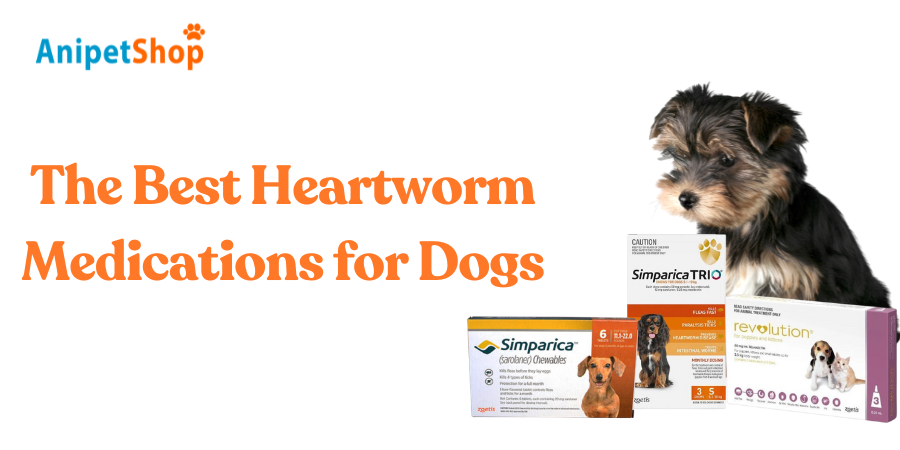
Best Heartworm Preventative Medicines for Dogs
Choosing the right heartworm medication for your dog is crucial. Our comparison chart highlights key differences between popular options, including active ingredients, parasite coverage, age/weight requirements, and food allergen considerations. Use this guide to find the safest and most effective prevention tailored to your dog’s unique needs.
| Oral Administration (monthly tablets and chews) | |||||
| Products | Ingredients | Other Parasites Treated in Addition to Heartworm | Minimum of age/weight | Safe to Use During Breeding/ Lactation | Food Allergen Considerations |
| HEARTGARD® Plus
Tri-Heart® Plus |
Ivermectin + pyrantel pamoate | Hookworms & Roundworms | 6 weeks/
no minimum weight |
Yes | Beef |
| Iverhart Plus® | Pork Liver | ||||
| Iverhart Max®
IMECTRO® |
Ivermectin + pyrantel pamoate + praziquantel | Hookworms, Roundworms & Tapeworms | 8 weeks/
6 lbs |
Not Evaluated | Pork liver
Artificial Beef |
| Interceptor®
MilbeGuard® Milbehart™ |
Milbemycin oxime | Hookworms, Roundworms & Whipworms | 4 weeks/
2 lbs |
Yes | Beef |
| Interceptor® Plus | Milbemycin oxime + praziquantel | Hookworms, Roundworms, Tapeworms & Whipworms | 6 weeks/
2 lbs |
Not Evaluated | Chicken |
| Sentinel® Flavor Tabs | Milbemycin oxime + lufenuron | Fleas, Hookworms, Roundworms, & Whipworms | 6 weeks/
2 lbs |
Yes | Artificial beef
Pork/soy |
| Sentinel® Spectrum® | Milbemycin oxime + lufenuron + praziquantel | Fleas, Hookworms, Roundworms, Tapeworms & Whipworms | 6 weeks/
2 lbs |
Not Evaluated | Beef |
| Trifexis® | Milbemycin oxime + spinosad | Fleas, Hookworms, Roundworms, & Whipworms | 8 weeks/
5 lbs |
Use with
caution |
Artificial beef
Pork liver/ hydrolyzed soy |
| NEXGARD® PLUS | Moxidectin +
afoxolaner + pyrantel |
Fleas & Ticks Hookworms, Roundworms | 8 weeks/
4 lbs |
Not Evaluated | None |
| Simparica® Trio | Moxidectin + sarolaner + pyrantel pamoate | Fleas & Ticks Hookworms, Roundworms | 8 weeks/
2.8 lbs |
Not Evaluated | Pork |
| Injectable Administration (every 6 or 12 months) | |||||
| Products | Ingredients | Other Parasites Treated in Addition to Heartworm | Minimum of age/weight | Safe to Use During Breeding/ Lactation | Food Allergen Considerations |
| ProHeart® 6 | Moxidectin | Hookworms | 6 months/
5 lbs |
Yes | None |
| ProHeart® 12 | 12 months/
5 lbs |
||||
| Topical Administration (monthly spot-on) | |||||
| Products | Ingredients | Other Parasites Treated in Addition to Heartworm | Minimum of age/weight | Safe to Use During Breeding/ Lactation | Food Allergen Considerations |
| Advantage Multi®
IMOXI™ PARASEDGE™ Multi Midamox™ |
Moxidectin + imidacloprid | Fleas, Hookworms, Roundworms,
Tapeworms and Sarcoptic Mange Mites |
7 weeks/
3 lbs |
Not Evaluated | None |
| Revolution®
Paradyne®( Senergy™ Selarid™ Revolt™ |
Selamectin | Fleas & Ticks, Ear Mites & Sarcoptic Mange Mites | 6 weeks/
no minimum weight |
Yes | |
Advantage Multi for Dogs – Best Topical
A broad-spectrum topical solution, Advantage Multi™ for Dogs, is a highly recommended option by vets for heartworm prevention. This monthly treatment not only protects against heartworms but also combats fleas, roundworms, hookworms, whipworms, and sarcoptic mange. The active ingredient, imidacloprid, effectively kills fleas through direct contact, eliminating the need for them to bite your dog.
In a controlled study funded by the manufacturer, Advantage Multi™’s combination of imidacloprid and moxidectin was proven to prevent heartworm infection throughout the month. Additionally, these ingredients target microfilaria, the larval stage of heartworms.
Key considerations:
- FDA-approved.
- Suitable for pets who dislike taking chews.
- Requires limiting interactions with other pets, especially cats, for 24 hours after application.
- May have a strong odor for the first 24-48 hours.
- Not ideal for dogs that are frequently bathed.
- Possible side effects include localized itching, lethargy, and reduced appetite.
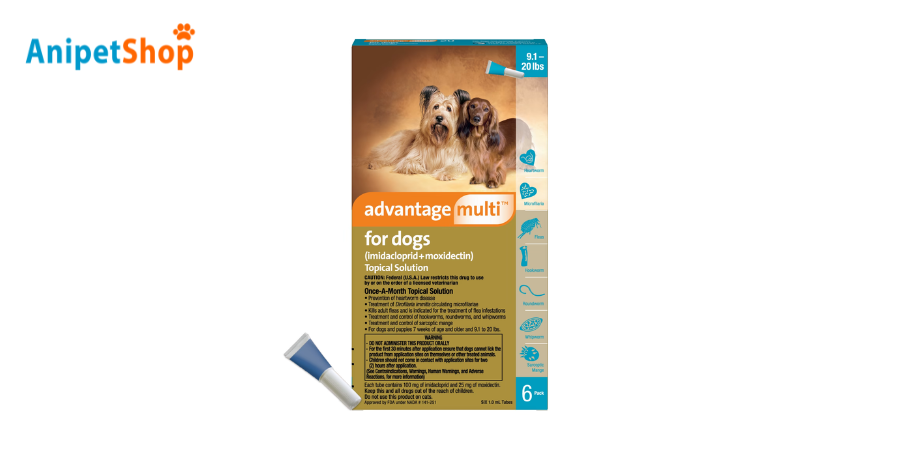
Heartgard Plus Chews for Dogs – Best Chew
For a heartworm, roundworm, and hookworm chew that combines effectiveness with a real-beef taste, Heartgard® Plus® Chew is a top choice recommended by vets. If your dog needs a tasty option to stay healthy, this chew might be just what they enjoy.The real-beef flavor makes it appealing even for picky pups, but it’s important to feed the chew in a way that encourages chewing rather than swallowing it whole. Heartgard Plus® combines ivermectin, which sterilizes adult heartworms and kills microfilaria, with pyrantel, which treats and controls hookworms and roundworms by paralyzing them, allowing the worms to be expelled in the dog’s feces.
Things to Consider:
- One of the most palatable chews available.
- Suitable for dogs of any size over 6 weeks of age.
- Contains beef flavoring, which may not be ideal for dogs with certain food allergies.
- Possible side effects include depression, lethargy, vomiting, anorexia, and diarrhea.
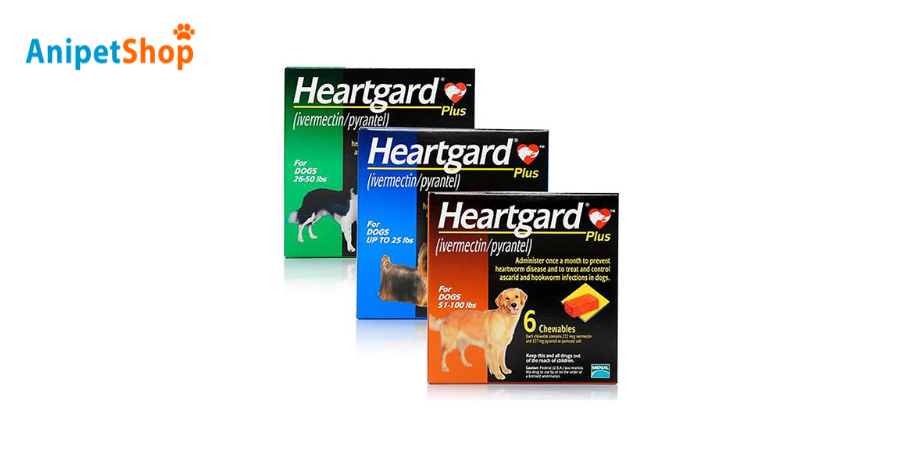
Iverhart Max Chew for Dogs – Best Budget
Iverhart Max® Chew combines ivermectin, pyrantel pamoate, and praziquantel to offer broad-spectrum protection against heartworm disease, as well as roundworms, hookworms, and tapeworms.
Things to Consider:
- FDA-approved.
- More cost-effective than other options on this list.
- May be less appealing to picky eaters.
- Chew cannot be split.
- Possible side effects include depression, lethargy, vomiting, anorexia, and diarrhea.
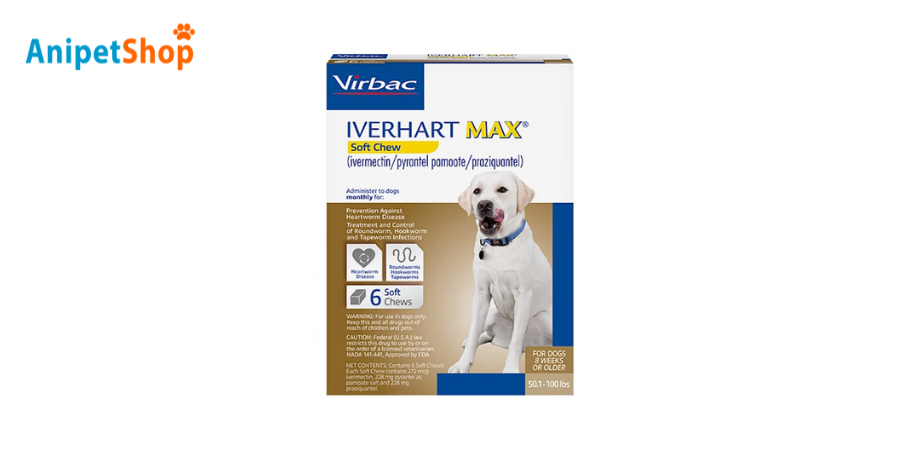
Interceptor Plus Chew for Dogs – Best In Show
Interceptor™ Plus stands out because it provides monthly defense against heartworms, roundworms, hookworms, whipworms, and tapeworms, making it ideal for dogs who frequent dog parks. Our vets love that this chew is needed only once a month and is suitable for all dog sizes, including small dogs and puppies over 2 pounds.
The chew contains two powerful anthelmintics: milbemycin oxime, which kills parasites by binding to chloride channels, and praziquantel, which weakens the parasite’s skin, allowing a dog’s immune system to eliminate it.
Things to Consider:
- Administer once a month, preferably on the same day each month.
- FDA-approved.
- Covers more intestinal parasites than other heartworm preventatives.
- Suitable for small dogs and puppies over 2 pounds.
- Possible side effects include vomiting, diarrhea, and lethargy or depression.
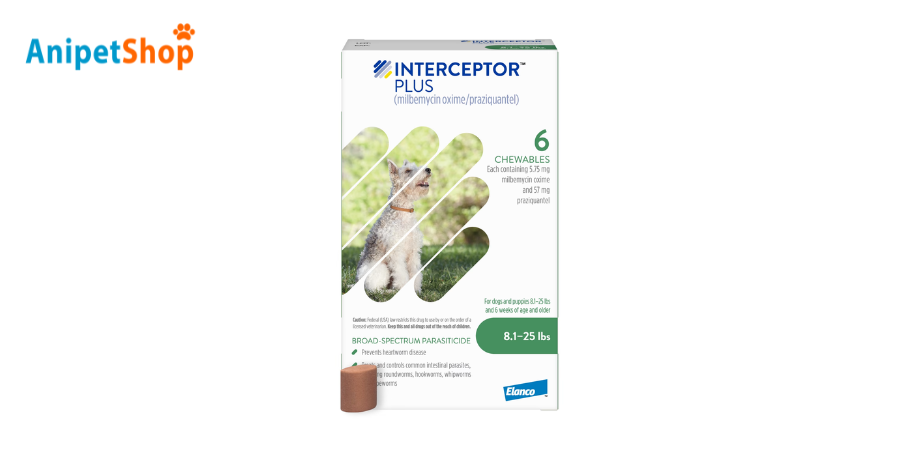
Simparica Trio Chewable Tablet for Dogs- Best All-In-One
For comprehensive protection against heartworms, fleas, ticks, roundworms, and hookworms, our vets recommend the Simparica Trio™ Chewable Tablet for Dogs. While no medication can truly cover everything, this multi-coverage option provides more protection than most others on the market.Each monthly chew packs a punch with sarolaner, which spreads through your dog’s system, killing ticks and fleas upon contact. Moxidectin treats intestinal parasites, and pyrantel controls and eliminates hookworms, making this chew a powerful choice for broader protection.
Our vets believe Simparica Trio™ is perfect for pet parents who want a preventative medication that goes beyond just heartworm, offering additional defense against fleas, ticks, and various intestinal parasites. Puppies as young as 8 weeks old and weighing at least 2.8 pounds can start on this monthly medication and continue it throughout their lives. Although the tablet is chewable, using a pill pocket might make it easier for your pup to take.
Things to Consider:
- FDA-approved.
- Kills five types of ticks.
- Multi-coverage includes heartworm and other parasites.
- Easier to administer with a pill pocket.
- Pricier due to increased parasite coverage.
- Possible side effects include vomiting, diarrhea, and lethargy.
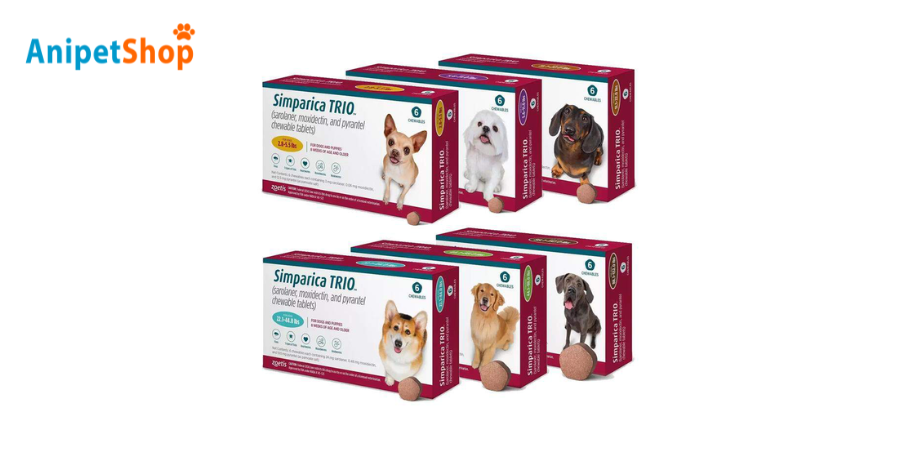
Nexgard PLUS Chew for Dogs – Best All-In-One (Runner-Up)
NexGard PLUS® contains afoxolaner, which effectively fights fleas and ticks, and milbemycin oxime, which combats heartworms by altering chloride levels within parasitic worms to eliminate them.
Things to Consider:
- FDA-approved.
- Protects against three species of hookworms, two species of roundworms, and four species of ticks.
- Does not protect against tapeworms.
- Possible side effects include diarrhea, vomiting, and lethargy.
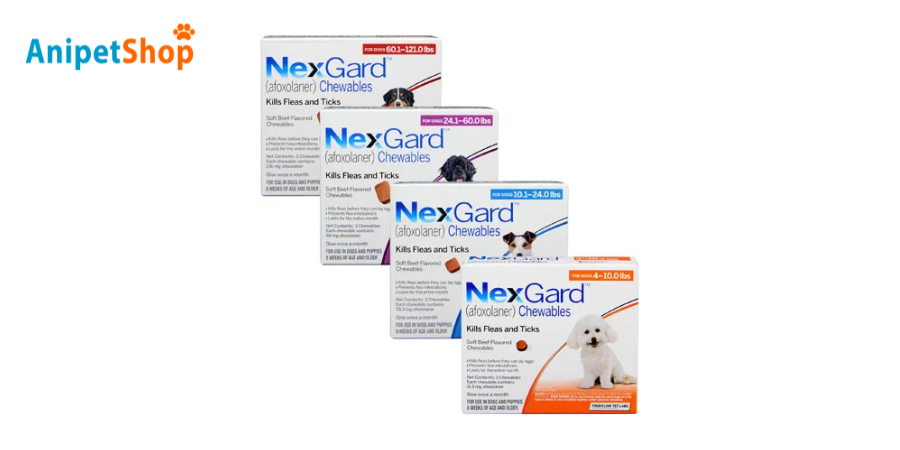
Common Side Effects of Heartworm Preventatives
Heartworm preventatives, whether oral, topical, or injectable, can have different side effects depending on how they are administered and their active ingredients. Let’s break down each type:
Oral Preventatives: usually work well for most dogs, but some may experience gastrointestinal issues such as
- Vomiting
- Diarrhea
- Loss of appetite
- Lethargy
- Hypersalivation
Topical Preventatives: are applied directly to the dog’s skin. The most common side effect is skin irritation at the application site, which might include:
- Skin irritation (redness, itching, hair loss)
- Vomiting (rare)
- Diarrhea (rare)
- Excessive salivation (rare)
- Nervous system disorders (rare)
Injectable Preventatives: like ProHeart 6/12, are given by a vet every six or twelve months. Possible side effects include:
- Swelling or tenderness at the injection site
- Lethargy
- Decreased appetite
- Hyperactivity
- Seizures (rare)
- Vomiting (rare)
- Diarrhea (rare)
- Allergic reactions (rare)
What to look for in heartworm prevention medication
When choosing heartworm prevention medication for your dog, it’s crucial to consider several key factors to ensure their health and safety. Here are the essential qualities to look for:
- Effective Heartworm Larvae Prevention: The best heartworm prevention medications stop heartworms from developing beyond the larvae stage, ensuring that these parasitic worms remain harmless to your dog.
- Comprehensive Parasite Coverage: Look for a heartworm medication that also covers other internal parasites such as hookworms and roundworms. These parasites can cause significant health problems, leading to more frequent vet visits.
- Safe and Effective Ingredients: Ensure that the heartworm medication you select contains vet-quality and FDA-approved active ingredients. Commonly used ingredients include:
- Ivermectin
- Milbemycin oxime
- Moxidectin
- Selamectin
- Pyrantel
- Minimal Risk of Adverse Reactions: Most dogs should tolerate heartworm prevention medications without any allergic reactions or side effects. However, certain herding breeds and mixed breeds with a genetic mutation called MDR1 may be more sensitive to some medications, particularly those containing ivermectin. Common breeds prone to the MDR1 gene include:
- Australian Shepherd
- Border Collie
- Collie
- German Shepherd
- Old English Sheepdog
- Shetland Sheepdog
- Miniature American Shepherd
- Skye Terrier
- Convenient Monthly Dosage: Heartworm preventatives are typically administered monthly, either in chewable tablets or topical applications. Consider a product that offers the convenience of a monthly delivery service, ensuring that your dog’s treatment is always on time. This can help you maintain consistency in your dog’s heartworm prevention regimen, reducing the risk of missed doses.
- Tailored to Your Dog’s Needs: Finally, consider your dog’s age, lifestyle, and the prevalence of heartworm disease in your area. For dogs that are flea-sensitive, you might need a separate product to control fleas in addition to heartworm prevention.
By carefully considering these factors, you can choose the most effective and safe heartworm prevention medication for your dog, ensuring their long-term health and well-being.
The Importance of Year-Round Heartworm Preventative Medicines
Heartworm disease, caused by the parasitic worm Dirofilaria immitis, can severely damage your dog’s heart, lungs, liver, and kidneys, eventually leading to death if left untreated. The American Heartworm Society strongly recommends that pets take heartworm prevention medication throughout the year, as it will help detect infections early, reducing the potential damage to your dog.
While heartworm transmission has traditionally been associated with warmer months when mosquitoes are most active, shifting weather patterns and the presence of indoor mosquitoes have blurred the lines of a ‘safe’ season. This unpredictability makes year-round prevention not just advisable but necessary. Consistent preventative measures are vital, given that heartworm cases have been reported in all 50 U.S. states, demonstrating the widespread risk.
Moreover, prevention is far more straightforward and cost-effective than treatment. Treating heartworm disease involves long-term medication, potential surgery, and a restrictive recovery period, which can be both complicated and expensive. Unfortunately, some dogs may never fully recover from the disease, living with its after-effects for the rest of their lives. In contrast, year-round heartworm preventatives are easy to administer and affordable, significantly reducing the risk of infection and ensuring your dog remains healthy.
Additionally, many heartworm preventatives also protect against other common parasites like ticks, fleas, and roundworms, providing an all-in-one solution for your pet’s parasitic defenses. A lapse in prevention, even briefly, can leave your dog vulnerable to infection and its severe consequences. By keeping your dog on heartworm prevention medication year-round and combining it with annual testing, you ensure that any infection is caught promptly, minimizing potential harm.
In conclusion, consistent, year-round heartworm prevention is the best way to keep your pet safe, healthy, and heartworm-free, offering peace of mind and comprehensive protection against a disease that could otherwise have devastating effects on your dog’s health.
Frequently Asked Questions
What is Natural Heartworm Prevention?
Exploring natural heartworm prevention methods can provide supplementary protection, but they shouldn’t replace FDA-approved medications. Natural remedies can enhance your dog’s overall health, which might indirectly help in reducing the risk of heartworm infection. Here are some holistic approaches you might consider:
- Herbal supplements: Certain herbs, like black walnut and wormwood, are often used in natural heartworm prevention. Always consult your vet before adding any herbal supplements to your dog’s regimen.
- Dietary adjustments: A balanced diet rich in antioxidants and essential nutrients can boost your dog’s immune system. Consider incorporating foods like carrots, blueberries, and fish oil into their meals.
- Essential oils: Some essential oils, such as eucalyptus and lavender, can act as natural mosquito repellents. However, essential oils should be used with caution and under the guidance of a veterinarian, as they can be toxic if not used properly.
- Holistic approaches: Regular exercise, stress reduction, and maintaining a clean living environment can contribute to your dog’s overall well-being, potentially lowering the risk of heartworm.
While these natural methods can be beneficial, they are not a substitute for proven, reliable heartworm medications. Always prioritize FDA-approved preventatives to guarantee your dog’s safety and health.
How to Strengthen Heartworm Prevention?
How can you confirm your dog’s heartworm prevention strategy is as robust as possible? Start by adopting effective preventative strategies like consistent medication and regular vet check-ups. Collaborate closely with your veterinarian to tailor the best prevention plan for your dog’s needs.
Community awareness plays an important role in heartworm prevention for dogs. Share information with fellow pet owners about the significance of year-round prevention. Utilize educational resources available through veterinary clinics, online platforms, and local pet organizations to stay informed about the latest prevention techniques.
Environmental factors also impact heartworm prevention for dogs. Make sure your home environment is mosquito-free by using screens and repellents, and avoid areas with high mosquito activity, especially during peak seasons. Regularly check for standing water around your property, as mosquitoes breed in stagnant water.
Veterinary collaboration is essential. Schedule regular vet check-ups to discuss heartworm prevention for dogs. annual heartworm tests and maintain open communication with your vet about any concerns or symptoms. This proactive approach helps catch potential infections early and adjust the prevention plan as needed.
Are There Any Risks of Medicinal Prevention of Heartworms?
While strengthening heartworm prevention is vital, it’s also important to understand the potential risks associated with medicinal prevention. Every medication comes with its own set of considerations. Let’s look at some key points for a thorough risks assessment.
- Resistance Concerns: Long-term use of the same heartworm medications can lead to resistance, making treatments less effective over time. This is why monitoring and adjusting treatments as needed, under veterinary guidance, is essential.
- Long Term Effects: Some heartworm preventatives might have long-term effects on your dog’s health. It’s important to discuss any concerns with your vet and weigh the benefits versus potential risks.
- Veterinary Guidance: Always consult your veterinarian before starting or changing any heartworm prevention regimen. They can provide personalized advice based on your dog’s health and lifestyle.
- Alternative Methods: While medicinal prevention is highly effective, integrating alternative methods like reducing mosquito exposure and regular testing can enhance your dog’s protection.
Medicinal heartworm prevention is generally safe and effective, but being aware of potential risks guarantees you make the best choices for your pet. Regular consultations with your vet and staying informed will help keep your dog healthy and heartworm-free.
Which Is Safer, Interceptor or Heartgard?
If your puppy weighs less than 2 pounds, Heartgard Plus might be the ideal choice, while Interceptor Plus is considered safe for lactating dogs. Additionally, if you’re looking to protect your dog from tapeworms and whipworms, Interceptor Plus is worth considering.
What heartworm medication has the least side effects?
Trifexis Chewable Tablet for Dogs – offers a potent formula that not only disrupts the heartworm life cycle but also eliminates fleas. It’s also effective against hookworms, roundworms, and whipworms. Clinical studies indicate that this medication typically doesn’t cause severe side effects, making it a safe choice, especially for herding breeds.
Conclusion
In conclusion, prioritize heartworm prevention to protect your dog’s health, and explore various medications that offer comprehensive protection against heartworms, fleas, ticks, and intestinal worms. Since the American Heartworm Society recommends year-round prevention due to unpredictable mosquito seasons, choose a medication that considers effectiveness, safety, and additional parasite coverage.
You can opt for oral chews, topical treatments, or injectables, and each option offers unique benefits and potential side effects. Consult your veterinarian to select the best preventative tailored to your dog’s needs, so you ensure their long-term health and well-being while minimizing risks. By consistently using these medications, you keep your dog heartworm-free and enjoy peace of mind.
References:
- Lobetti, R., Brianti, E., Cassini, R., Calderini, P., Furlanello, T., Genchi, C., … Antognoni, L. (2021). Tick-borne pathogens in dogs living in different areas of Italy: Seroprevalence and risk factors. PLOS ONE, 16(8), e0255847. https://doi.org/10.1371/journal.pone.0255847
- Otranto, D., Dantas-Torres, F., Breitschwerdt, E. B., & Olson, M. A. (2016). The globalization of canine vector-borne diseases: Emerging threats and vector control challenges. Trends in Parasitology, 32(4), 246–259. https://doi.org/10.1016/j.pt.2015.12.001
- Veterinary Partner. (n.d.). Tick-borne diseases. https://veterinarypartner.vin.com/default.aspx?pid=19239&id=4951375
Lily Watson is an author specializing in veterinary care in Australia. With a profound passion for animal welfare and a solid foundation in veterinary science, Lily has dedicated herself to disseminating valuable knowledge and information for both pet owners and professionals in this field.

